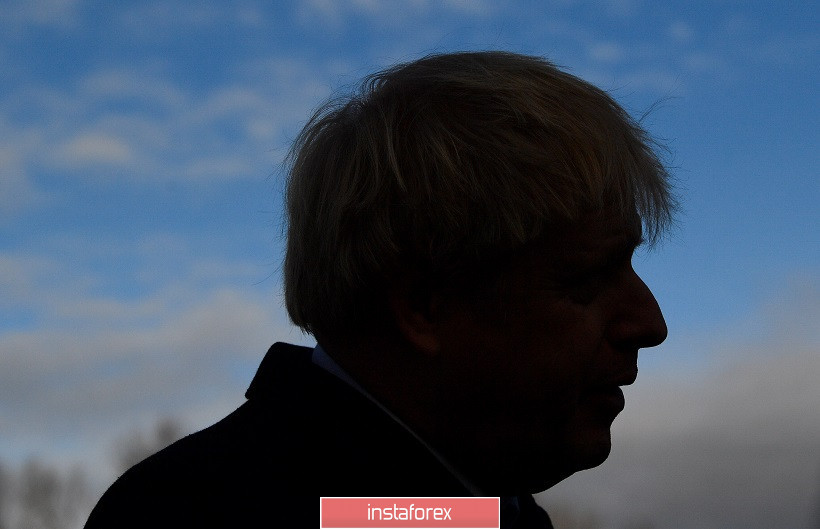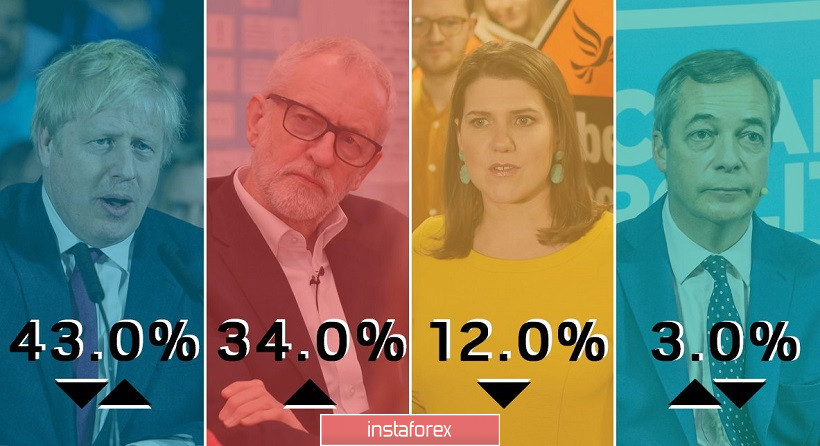The pound-dollar pair updated its 9-month high yesterday, reaching 1.3220. However, when the last YouGov poll was released, during the Asian session, the pair slowed down and returned to the bottom of the 31st figure. The results of a sociological study made traders nervous since the situation is borderline: experts did not rule out the option of the so-called "suspended" Parliament, when neither Conservatives nor Labour could form their own majority. This is one of the negative scenarios for the pound, so there was a halt in the growth of GBP/USD.
Nevertheless, despite the inconsistency of the news flow, the British currency is kept at high price levels. Neither weak GDP growth, nor the declining rating gap between Conservatives and Labour could support the bears. Moreover, the continuing intrigue regarding the results of tomorrow's elections will further strengthen the upward momentum, if Boris Johnson can still take the majority in the House of Commons.

But let's start with macroeconomic reports. First of all, traders were disappointed with Britain's GDP growth rate. This indicator reached zero in October (with a forecast of growth of up to 0.1%) on a monthly basis. The economy of Great Britain "froze in place" after a sequential decline for two months - in September and August. In a way, this is an anti-record: for the first time in ten years, GDP growth has not been observed for three consecutive months. In annual terms, the key indicator increased by only 0.7% - this is the weakest growth rate since 2012.
The structure of indicators indicates that the construction sector showed the worst results: the volume fell by 2.3% (the sharpest decline since January 2018). In addition, the inventory component was declining at the most active rates: in anticipation of a possible "hard" Brexit in October, many enterprises and companies spent their reserves. The British auto industry also failed - again, because of Brexit. Last week it became known that car production in Britain fell by almost 5% due to lower demand (first of all, sales of diesel cars in the EU countries fell). The decline has been recorded for 16 consecutive months. The level of investment in the British auto industry has also significantly declined.
Of the positive aspects of yesterday's release, one can note the component in the services sector (growth was marked at 0.2% in October, the first time in three months) and foreign trade indicators. The volume of imports grew by more than 8% compared to the previous month, while exports also showed positive dynamics (growth by 2%).
But overall, the performance of the British economy disappointed. As are the indicators of industrial production. In monthly and annual terms, the indicators came out in the red zone, not reaching the forecast values (0.1% and -1.3%, respectively). But the volume of production in the construction sector slumped to -2.3% (on a monthly basis) - this is the weakest result since last December. And although experts expected a downward trend in the above indicators, real numbers turned out to be worse than pessimistic forecasts.
Despite such weak releases, the GBP/USD pair updated its multi-month high after yesterday. This suggests that the pound is now slightly susceptible to any forecasts (both long-term and short-term), as news regarding the prospects of the upcoming elections overshadows macroeconomic reports.
A key poll from YouGov has just been released, in which almost 106 thousand people took part. According to the published data, Conservatives have almost 43% of the vote, while their main opponents the Labour Party can gain almost 34%. On the one hand, the Tories confidently hold the palm. On the other hand, on the eve of election day, Laborites narrowed the gap from the Conservatives. So, according to a previous similar poll (which was conducted at the end of November), the party of Boris Johnson gained approximately 359 mandates. And according to the latest data, Conservatives can only count on 339 out of 650 seats in the House of Commons, while Labour can get 231 seats (which is 20 more than before).

Given the well-known error of sociological research, it can be assumed that Johnson will receive around 310 to 370 seats in the House of Commons. This suggests that the option of a "suspended" Parliament is not at all excluded. If Conservatives fail to form their own majority, they will have to look for allies (Unionists in the previous Parliament), and it's not at all a fact that they will be able to do so. And even if the Tories conclude a situational alliance with other political forces, this does not mean that their allies will support the deal with Brussels, for which, in fact, the early elections were launched. In other words, the situation is uncertain on the eve of election day, and this fact will put pressure on the pound until the announcement of the results of the plebiscite.
Polling stations will open on December 12 at 7:00 and close at 22:00 (local time). The vote count will go on all night and tentatively it will become clear in the morning of December 13th whether Brexit will be implemented according to the "soft" scenario next year or whether the negotiating epic will continue again.
 English
English 
 Русский
Русский Bahasa Indonesia
Bahasa Indonesia Bahasa Malay
Bahasa Malay ไทย
ไทย Español
Español Deutsch
Deutsch Български
Български Français
Français Tiếng Việt
Tiếng Việt 中文
中文 বাংলা
বাংলা हिन्दी
हिन्दी Čeština
Čeština Українська
Українська Română
Română

